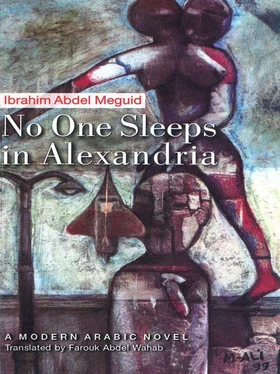All at once, groups of beautiful young women appeared, laughing. They wore colorful tight pants and tight tops, and their faces were made up and their hair donc à la garçon. Zahra was astonished that women would cut their hair in this boyish style. Sitt Maryam noticed Zahra’s reaction and said, “Don’t worry about it.”
From inside one of the stores, Zahra heard someone comment, “Well, well, well! When are we going to become English?” Then she heard the young women laughing boisterously. One of them shot back, “When hell freezes over, buster! Not even if you became French!”
Zahra smelled the strong odor of tobacco smoke and saw in front of her a store with a red facade and big black lettering, with a scale on the counter, behind which a man sat smoking a narghile. On the shelves were small boxes and many cigarette packs. She saw several of these stores with red facades, apparently characteristic of tobacco shops. Sitt Maryam pointed to a street from which came a strong smell of ghee, coconut, and sugar.
“This is the piazza of the Syrians. They are all pastry makers,” she said. “This is al-Laythi Street, the most famous street for antiques in Alexandria. Here they sell French objets d’art, Belgian chandeliers, Swiss watches, Italian chairs, and expensive things from all over the world.” Zahra was reminded of the strong, European-looking face of the man that she had seen smoking the narghile in the tobacco shop.
A woman in a white nightgown came rushing out of a side alley, holding a man by the scruff of his neck. After giving him a smack on the back of his neck, she pushed him into the street, then stood for a moment looking around. She was barefoot, her hair disheveled, with sparks flying from her tired eyes. Then she went back into the little alley, and three scantily clad women, who had stood by the entrance and watched as she kicked the man out, followed her inside. A young coffeehouse boy carrying a tray with a coffee cup, a small coffee pot, and a glass of water almost ran into the man who had just been beaten. But he skillfully stepped aside, laughing, “In this place, it’s sweet to be smacked on the back of the head.” The man staggered toward Zahra, who was scared and hid behind Sitt Maryam. Sitt Maryam quickly bent down, took off her slipper, and waved it in the face of the man, who stepped back, giving her a military-style salute as the vendors in their stores laughed.
Sitt Maryam and Zahra went on through al-Laythi Street, where the antiques caught her eye, as did the men and women who moved slowly and gracefully among the wares, looking at and examining them. There was a strong smell of wood varnishes, paint, and alcohol.
“We’ve made it to the Arab street. You’ll find all kinds of furniture here.”
Zahra noticed that one alley was filled entirely with shoes of every style and color, on high tables and low tables and on the sidewalks. She saw another long alley filled with displays of used clothing, and shirts, jackets, and overcoats hung in the store entrances, giving off a faint smell. Then they entered a short street, neither wide nor narrow. In front of the shop doors were living-room sets and all kinds of chairs — wooden, upholstered, bamboo. Little boys were dusting them with feather dusters.
“Good morning, Blessed William.”
“Good morning, Sitt Maryam.”
He knows her by name, Zahra thought to herself. She realized that here she could sit down for a little while. She needed that, after having nearly screamed to leave the whole neighborhood.
Blessed William was about fifty, short with a strong build, wearing a clean gallabiya and a fez on his head.
“It’s been a while,” he said, offering two chairs to Sitt Maryam and Zahra, who sat down at once. The the smell of the concrete floor recently doused with water reached her nostrils, and the smell of frankincense burning deep inside the dark store soothed her nerves. A little boy appeared and the man said to him, “Quick, get a pitcher of carob drink.”
Blessed William went to different points on the wall and lit up the big, long store, revealing shiny armoires, beds, tables, chairs, and other pieces of furniture.
“How are things, Blessed William?” Sitt Maryam asked.
“Things are bad. The war has broken out, and everything is going sky high.”
“The war broke out only yesterday, Blessed William.”
“We’ve been living in fear for the last few months. The drunken English have chased the customers away. I swear by God, I considered selling the store to a Moroccan or a Greek. Only last night, some hoodlums caught three drunken Englishmen and beat them and stole their money. A police force from Kom al-Dikka came and dragged everyone to the governorate headquarters and beat them on the back of the neck until they almost went blind.” He laughed and added, “I was there — I went to the governorate because they’d arrested one of my workers. There was this Indian soldier there who really upset me — he stood there saying ‘Again, again,’ as the the secret police were beating the men. Can you imagine that? An Indian! I wanted to tell him that Gandhi was starving himself to death so that people like him would become real human beings, not lackeys to the English.”
“And then?”
“They let the people go, of course. The hoodlums were long gone.”
“Everyone’s turn will come,” remarked Zahra.
Blessed William took a long look at her and said, “You are good-hearted.”
An old woman with heavy make-up and bright yellow dyed hair passed in front of the store. She was carrying a cheap red leather handbag and wearing a short skirt and a pair of sheer red stockings, through which the green veins of her legs showed. Zahra recoiled and Blessed William said, “One day the land will be cleansed.”
Sitt Maryam could not tell Zahra that in that neighborhood, at the end of the street where they had walked and in the narrow alleys, many women were prostitutes. Zahra must have figured that out for herself, but she had begun to feel a little pain in her breasts, and drops of milk were leaking from her nipples and staining her gallabiya. She had to buy what she needed quickly so that she could hurry back to her baby daughter.
“On our way back we’ll buy the fabric and cotton for the mattress and pillows,” Sitt Maryam told her. “Tomorrow you’ll have the furniture of a bride, God bless it.”
But Zahra, desperate for anything that would give her happiness, still felt ill at ease and afraid of the city.
“I want a sane man to consult about a problem.”
“The only sane man in our city is this madman.”
Jalal al-Din Rumi
Did Alexander know that he was building not just a city to immortalize his name, but a whole world and a whole history? Probably: he was concerned not just with immortality, but with changing the world.
The distance from Pharos Island, now Anfushi, to Rhakotis, now Karmuz, took one hour on foot. It must have taken the same amount of time in the old days, because there were no buildings to walk around. The land was flat and sandy. Therefore when Alexander stopped his horse in Rhakotis, he was able to see the farthest spot in the sea, Pharos, and he decided to connect the two points — but he died before that was done. It was Ptolemy I and his successor, Ptolemy II, who actually finished building the city. Alexander had laid the city’s foundation stone and delegated the task of planning to Dinocrates, a skilled architect. He planned it like a chessboard, with streets running straight from north to south intersected by straight east-west streets. Why did he plan it like a chessboard? Did he intend for it to be a stage for playing and dying? Its inhabitants, under Augustus, after the death of Antony and Cleopatra, numbered three hundred thousand free citizens and an equal number of slaves. But Alexandrians were fond of cockfights and writing verses that made fun of the rulers. That was why, when Napoleon Bonaparte conquered it, its inhabitants numbered only eight thousand.
Читать дальше












